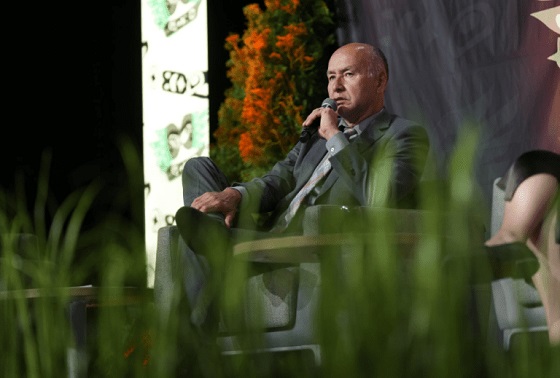Business
Trump eyes end of capital gains tax in 2025

 MxM News
MxM News
Quick Hit:
In a historic announcement that rattled markets and reignited debate over tax policy, President Donald Trump revealed plans to eliminate the capital gains tax starting in 2025. The unprecedented move would allow Americans to retain all profits from asset sales—whether in stocks, real estate, or other investments. Supporters tout it as a bold pro-growth measure, while critics warn it may cause budget strain and market instability.
Key Details:
-
President Trump announced the elimination of capital gains tax effective 2025, describing it as a move to reward success and promote wealth-building.
-
Currently, capital gains are taxed at rates up to 20%, with additional surcharges for high earners.
-
The announcement caused a major rally across financial markets, though critics claim the change favors the wealthy and could disrupt the economy.
Diving Deeper:
At a press conference on Monday, President Trump laid out a sweeping proposal to eliminate the capital gains tax in its entirety, calling it a “long-overdue correction” to what he described as a punitive tax on prosperity. “Why should you be punished for building wealth?” he asked. “This is America—we reward success.” If enacted, the change would allow investors to retain 100% of profits from the sale of assets such as stocks, homes, and businesses, with zero tax liability.
This proposal marks a sharp departure from decades of entrenched U.S. tax policy. Currently, long-term capital gains are taxed at rates ranging from 0% to 20%, with potential surcharges including the 3.8% Net Investment Income Tax for high earners. Trump’s plan would zero out those liabilities entirely starting in the 2025 tax year.
Conservative economists and market analysts have lauded the move as potentially the most transformative supply-side reform since the Reagan era. They argue that removing the tax will unshackle trillions of dollars currently locked in unrealized gains, spurring investment, entrepreneurship, and broader economic dynamism. “This is a game-changer,” said one pro-growth advocate. “It sends a clear message that America is back to being the most investment-friendly nation on Earth.”
Predictably, left-wing critics erupted. One Democratic senator labeled the measure a “grenade” that would detonate the federal budget and widen the wealth gap. Others warned of asset bubbles and increased volatility as investors rush to dump assets ahead of the reform’s implementation. These concerns, however, do not seem to have spooked the markets—at least not yet.
The Dow Jones Industrial Average jumped nearly 600 points following the announcement, while cryptocurrencies surged on expectations of tax-free gains. Real estate portals and trading platforms like Robinhood and E*TRADE saw surges in activity as users began strategizing around the policy’s timing. Online, the announcement triggered a wave of memes and commentary. The hashtag #NoCapGains began trending on X (formerly Twitter), with some calling it a “wealth liberation act” and others denouncing it as “Robin Hood in reverse.”
Legislation to formalize the proposal is expected to hit Congress within weeks. While Republicans have largely expressed support, Democrats are preparing for a fierce battle. It’s unclear whether some establishment Republicans—many of whom have been resistant to bold reform under Trump—will help move the bill forward or slow-walk it in favor of more moderate compromises.
Until the law is officially passed, financial advisors are urging caution. “The promise of zero capital gains tax is tempting,” one planner said, “but don’t bet the farm until it’s signed, sealed, and delivered.”
Still, with the 2025 tax season approaching fast, the stakes are enormous. If passed, Trump’s plan would not only mark one of the most dramatic tax overhauls in modern history—it would redefine the very incentives that drive American investment and wealth accumulation.
Business
The Grocery Greed Myth

Haultain’s Substack is a reader-supported publication.
To receive new posts and support our work, please consider becoming a free or paid subscriber.
Try it out.
The Justin Trudeau and Jagmeet Singh charges of “greedflation” collapses under scrutiny.
“It’s not okay that our biggest grocery stores are making record profits while Canadians are struggling to put food on the table.” —PM Justin Trudeau, September 13, 2023.
A couple of days after the above statement, the then-prime minister and his government continued a campaign to blame rising food prices on grocery retailers.
The line Justin Trudeau delivered in September 2023, triggered a week of political theatre. It also handed his innovation minister, François-Philippe Champagne, a ready-made role: defender of the common shopper against supposed corporate greed. The grocery price problem would be fixed by Thanksgiving that year. That was two years ago. Remember the promise?
But as Ian Madsen of the Frontier Centre for Public Policy has shown, the numbers tell a different story. Canada’s major grocers have not been posting “record profits.” They have been inching forward in a highly competitive, capital-intensive sector. Madsen’s analysis of industry profit margins shows this clearly.
Take Loblaw. Its EBITDA margin (earnings before interest, taxes, depreciation, and amortization) averaged 11.2 per cent over the three years ending 2024. That is up slightly from 10 per cent pre-COVID. Empire grew from 3.9 to 7.6 per cent. Metro went from 7.6 to 9.6. These are steady trends, not windfalls. As Madsen rightly points out, margins like these often reflect consolidation, automation, and long-term investment.
Meanwhile, inflation tells its own story. From March 2020 to March 2024, Canada’s money supply rose by 36 per cent. Consumer prices climbed about 20 per cent in the same window. That disparity suggests grocers helped absorb inflationary pressure rather than drive it. The Justin Trudeau and Jagmeet Singh charges of “greedflation” collapses under scrutiny.
Yet Ottawa pressed ahead with its chosen solution: the Grocery Code of Conduct. It was crafted in the wake of pandemic disruptions and billed as a tool for fairness. In practice, it is a voluntary framework with no enforcement and no teeth. The dispute resolution process will not function until 2026. Key terms remain undefined. Suppliers are told they can expect “reasonable substantiation” for sudden changes in demand. They are not told what that means. But food inflation remains.
This ambiguity helps no one. Large suppliers will continue to settle matters privately. Small ones, facing the threat of lost shelf space, may feel forced to absorb losses quietly. As Madsen observes, the Code is unlikely to change much for those it claims to protect.
What it does serve is a narrative. It lets the government appear responsive while avoiding accountability. It shifts attention away from the structural causes of price increases: central bank expansion, regulatory overload, and federal spending. Instead of owning the crisis, the state points to a scapegoat.
This method is not new. The Trudeau government, of which Carney’s is a continuation, has always shown a tendency to favour symbolism over substance. Its approach to identity politics follows the same pattern. Policies are announced with fanfare, dissent is painted as bigotry, and inconvenient facts are set aside.
The Grocery Code fits this model. It is not a policy grounded in need or economic logic. It is a ritual. It gives the illusion of action. It casts grocers as villains. It gives the impression to the uncaring public that the government is “providing solutions,” and that “it has their backs.” It flatters the state.
Madsen’s work cuts through that illusion. It reminds us that grocery margins are modest, inflation was monetary, and the public is being sold a story.
Canadians deserve better than fables, but they keep voting for the same folks. They don’t think to think that they deserve a government that governs within its limits; a government that accept its role in the crises it helped cause, and restores the conditions for genuine economic freedom. The Grocery Code is not a step in that direction. It was always a distraction, wrapped in a moral pose.
And like most moral poses in Ottawa, it leaves the facts behind.
Haultain’s Substack is a reader-supported publication.
To receive new posts and support our work, please consider becoming a free or paid subscriber.
Try it out.
Business
Tax filing announcement shows consultation was a sham

The Canadian Taxpayers Federation is criticizing Prime Minister Mark Carney for announcing that the government is expanding automatic tax filing within hours of the government’s consultation ending.
“There’s no way government bureaucrats pulled an all-nighter reading through thousands of submissions and survey responses before sending Carney out to make an announcement on automatic tax filing the next morning,” said Franco Terrazzano, CTF Federal Director. “Asking Canadians for their opinion and then ignoring them isn’t a good look for Carney, it makes it look like the government is holding sham consultations.”
The government of Canada announced consultations on automatic tax filing so Canadians could give the government “broad input through an online questionnaire.”
The government’s consultation ended on Thursday, Oct. 9, 2025.
Hours after the consultation ended, Carney today announced the government would expand automatic tax filing.
The CRA is already one of the largest arms of the federal government with 52,499 bureaucrats.
The CRA added 13,015 employees since 2016 – a 33 per cent increase. For comparison, America’s Internal Revenue Service has 90,516 bureaucrats. The CRA has one bureaucrat for every 800 Canadians. The IRS has one bureaucrat for every 3,800 Americans.
“The CRA can barely answer the phone, so Carney shouldn’t be giving those bureaucrats more busy work to do,” Terrazzano said. “The CRA is a bloated mess, and Carney should be cutting the cost of bureaucracy not scheming up ways to give the bureaucracy more power over taxpayers.”
The CRA only answered about 36 per cent of the 53.5 million calls it received between March 2016 and March 2017, according to a 2017 Auditor General report. When Canadians were able to get the CRA on the phone, call centre agents gave inaccurate information about 30 per cent of the time.
“The CRA acting as both tax collector and tax filer is a serious conflict of interest,” Terrazzano said. “Trusting the taxman to do your tax return is like trusting your dog to protect your burger.
“Carney should stop the CRA power grab and instead cut taxes and simplify the tax code.”
-

 National13 hours ago
National13 hours agoCanada’s birth rate plummets to an all-time low
-

 Crime12 hours ago
Crime12 hours agoPierre Poilievre says Christians may be ‘number one’ target of hate violence in Canada
-

 Alberta11 hours ago
Alberta11 hours agoJason Kenney’s Separatist Panic Misses the Point
-

 Automotive14 hours ago
Automotive14 hours agoBig Auto Wants Your Data. Trump and Congress Aren’t Having It.
-

 Aristotle Foundation2 days ago
Aristotle Foundation2 days agoEfforts to halt Harry Potter event expose the absurdity of trans activism
-

 Bruce Dowbiggin2 days ago
Bruce Dowbiggin2 days agoCanada’s Humility Gene: Connor Skates But Truckers Get Buried
-

 Energy2 days ago
Energy2 days ago“It is intellectually dishonest not to acknowledge the … erosion of trust among global customers in Canada’s ability to deliver another oil pipeline.”
-

 Energy2 days ago
Energy2 days agoIn the halls of Parliament, Ellis Ross may be the most high-profile advocate of Indigenous-led development in Canada.







